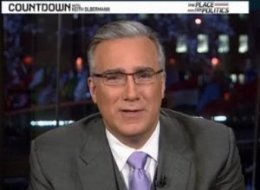Saturday, January 22, 2011
The Enduring Lesson of Keith Olbermann

Depending on your politics and personal tastes, Keith Olbermann is a liberal pundit, a newsman, an overhyped sports reporter, a propagandist, the voice of the nation's conscience, or a traitor to his country. Last evening, he added one title most can agree on -- unemployed. Olbermann, the host of MSNBC's Countdown With Keith Olbermann
Olbermann had a decidedly and unashamedly liberal bent to his show. He openly loathed Fox News, which he called "faux news," and particularly Bill O'Reilly
Even if you loved Olbermann's politics, there was plenty to squirm about in Olbermann's style. He often used the same kind of "anyone who disagrees with me is an idiot" kind of rhetoric that he criticized in O'Reilly. His segments with guest commentators often fit the formula:
- Introduce story by stating the facts intertwined with Olbermann's opinion
- Introduce guest
- Ask guest whether Olbermann's opinion is the only reasonable one, as he thinks
- In unlikely event guest disagrees, restate opinion as fact and wait for response
I'm writing about Keith Olbermann today, however, not because of my personal feelings about him leaving MSNBC or even about the show itself. Keith Olbermann deserves a nod because of something absolutely unheard of which he did, on air, with great frequency. Keith Olbermann apologized.
When you are as unabashedly partisan and fiery as Olbermann is, you wind up saying a lot of things that make people mad. And certainly, Olbermann stood behind the majority of what he had to say nonetheless. But every once in a while, Keith Olbermann had the good sense and the good grace to admit when he was wrong. A terrific example occurred after Olbermann raised questions and spoke, in a way that some felt was offensive, about the rape accusations against Wikileaks
Rape has touched my family, directly and savagely, and if anybody thinks I have addressed it without full sensitivity, then that assessment is the one that counts, and I apologize.Read that again, because you won't hear apologies
Most recently, Olbermann delivered a passionate and, in my opinion, moving commentary the night of the shootings in Tucson on January 9th. He discussed the current political climate but, unlike many other liberal commentators, he didn't put the blame on the right. He said,
Violence, or the threat of violence, has no place in our Democracy, and I apologize for and repudiate any act or any thing in my past that may have even inadvertently encouraged violence. Because for whatever else each of us may be, we all are Americans.So, why am I bringing this up on a blog about trauma and crisis response? Because very often, after a major incident, the impulse of those in charge is to circle the wagons and vehemently deny any responsibility. The result is that those affected, who are primed to be looking for someone to blame, have a reason to step up their blame of those in charge. Few and far between are people in authority willing to say, "This shouldn't have happened, we didn't want for it to happen either, and we will be carefully reviewing everything to make sure it doesn't happen again," let alone, "We screwed up, and while we don't think this is entirely our fault, we are willing to take some of the blame. We're sorry."
It's always easier to blame those who are upset then to take a good long look at yourself. Failure to do so, however, often makes it worse. Whatever you think of Keith Olbermann, his show, or his politics, I hope that, with his departure, we don't also lose his excellent example of how to apologize gracefully and sincerely for the mistakes we all make in this world.

Subscribe to:
Post Comments (Atom)
Meet the Quarterback

- Naomi Zikmund-Fisher
- is a clinical social worker, former school Principal and a Crisis Consultant for schools and community organizations. You can learn more about her at www.SchoolCrisisConsultant.com
Contact the Quarterback
Monday Morning Crisis Quarterback on Facebook
Subscribe via email
Quarterback for Kindle
Blog Archive
-
▼
2011
(66)
-
▼
January
(9)
- We Stand with Egyptians, but Egyptian-Americans? N...
- The Challenger Disaster 25 Years On
- The Enduring Lesson of Keith Olbermann
- Tucson and the Quest for Meaning
- Two Personal Notes from the Tucson Shootings
- Searching for a Cause in Tucson
- Rep. Gabrielle Giffords Shot, U.S. District Court ...
- Two Administrators Shot at Omaha, NE High School
- David Senft: A Foreseeable Suicide that Wasn't For...
-
▼
January
(9)



0 comments:
Post a Comment